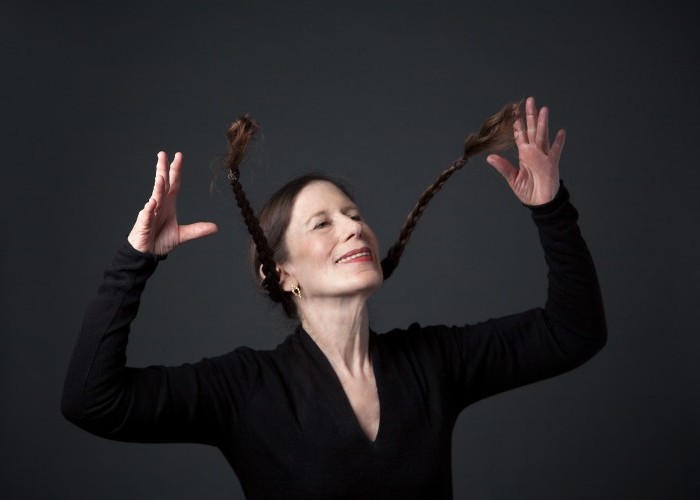Jan 13, 2026 2:09 PM
More Trump-Kennedy Center Cancellations
The fallout from the renaming of the John F. Kennedy Center for the Performing Arts to include President Donald…

Vocalist Meredith Monk says she’s blessed to be “discovering new things and new ways of producing sound and new ways of putting music together that are very complex little forms” after a decade’s long career.
(Photo: Christine Alicino)Musicians often wind up in a sort of tug of war, trying to balance their past while still producing modern work.
Meredith Monk, 77, is amid that struggle. The vocalist and contemporary classical composer is, as she said during a recent conversation with DownBeat, working more than ever these days. But it’s often at the behest of organizations and ensembles that want to hear her older material. Last year, that included the L.A. Philharmonic, which staged a new production of her Atlas: An Opera In Three Parts; working with the Bang on a Can All-Stars to rearrange a number of her pieces for a recording called MEMORY GAME—which the group will perform live with Monk and her Vocal Ensemble at the Big Ears Festival in Knoxville, Tennessee; and her career-spanning solo performance during the November celebration of ECM Records’ 50th anniversary at Jazz at Lincoln Center.
Monk has some understandable concerns about how much more music she can produce in her remaining years and what, beyond the recordings of her work, she’s going to leave behind. She recently signed with music publishers Boosey & Hawkes to help protect her work—including some of her more difficult-to-transcribe-and-translate pieces that make use of unusual sounds and rhythms produced by the voice—and keep it available for future generations. Her personal archives currently are available for research through the New York Public Library for the Performing Arts.
Yet, it does seem as if letting someone else be the curator and protector of her life’s work has liberated Monk in a way. During 2018, she produced the large-scale multimedia Cellular Songs that included video and choreographed movement to explore the struggle between collectivism and individualism. And she’s excitedly juggling several pieces and commissions that will keep her busy well beyond the winter.
The following has been edited for length and clarity.
How have you had to adjust your writing and performing to account for changes in your singing voice over the years?
I always was very interested in all aspects of the human voice. Highs, lows, male, female. Different ways of producing sound. So, in a way, my way of thinking about things has not had to change that much, because I keep on looking to explore new areas in my voice. I’ve just been so blessed that, to this day, I’m still discovering new things and new ways of producing sound and new ways of putting music together that are very complex little forms.
I ask because I wanted to understand how you’re approaching the piece that you’re premiering at Big Ears—MEMORY GAME, which involves your older work.
It does, but it’s mostly work that has never been recorded before. The process was really a recording project and, now, since we finished the recording project, we’ve gone on to think about performing it live. But most of the pieces had not been recorded before. A large portion of that performance and CD is a suite called The Games: a science fiction opera, which emerged in the early 1980s. And one piece, Memory Song, was recorded by Manfred [Eicher], but the arrangement was made by Julia Wolfe in the late ’90s for the Bang on a Can All-Stars. So, it’s a very different kind of arrangement. Plus, I’m singing different parts than I did in those days.

Belá Fleck during an interview with Fredrika Whitfield on CNN.
Jan 13, 2026 2:09 PM
The fallout from the renaming of the John F. Kennedy Center for the Performing Arts to include President Donald…

Peplowski first came to prominence in legacy swing bands, including the final iteration of the Benny Goodman Orchestra, before beginning a solo career in the late 1980s.
Feb 3, 2026 12:10 AM
Ken Peplowski, a clarinetist and tenor saxophonist who straddled the worlds of traditional and modern jazz, died Feb. 2…

The success of Oregon’s first album, 1971’s Music Of Another Present Era, allowed Towner to establish a solo career.
Jan 19, 2026 5:02 PM
Ralph Towner, a guitarist and composer who blended multiple genres, including jazz — and throughout them all remained…

Rico’s Anti-Microbial Instrument Swab
Jan 19, 2026 2:48 PM
With this year’s NAMM Show right around the corner, we can look forward to plenty of new and innovative instruments…

Richie Beirach was particularly renowned for his approach to chromatic harmony, which he used to improvise reharmonizations of originals and standards.
Jan 27, 2026 11:19 AM
Richie Beirach, a pianist and composer who channeled a knowledge of modern classical music into his jazz practice,…